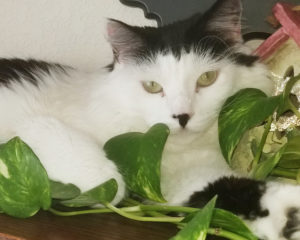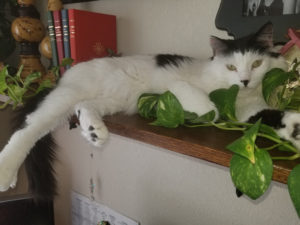Abdominal Bloating In Cats: Moo’s Story

Life can sometimes take unexpected turns that lead to unanswered questions. Some cat health issues even leave veterinarians scratching their heads! I met a kitty named Moo this week when his parents, Lisa and Gary reached out for help. He began showing signs of abdominal bloating a few months ago which can be a very serious condition. Abdominal bloating in cats is due to inflammation, but what was causing his?
Symptoms of abdominal bloating in cats
There can be many reasons why cats develop abdominal bloating, also known as peritonitis. Peritonitis occurs when the peritoneum, the thin lining of the abdominal cavity, becomes inflamed. It can be very painful and sensitive to touch for many cats. According to an article in wagwalking.com, there are a number of symptoms to watch for:
- Abdominal pain
- Reluctance to move
- Positioning itself in a “praying” position in order to relieve pain
- Loss of appetite (anorexia)
- Weight loss
- Weakness
- Lethargy
- Depression
- Vomiting
- Diarrhea
- Fever
- Low blood pressure (hypotension)
- Increased heart rate
- Abnormal heart rhythm (arrhythmia)
- Shock (septic)
Possible causes of abdominal inflammation
The article goes on to describe several possible causes of abdominal inflammation including:
- Feline infectious peritonitis
- Injury or trauma to abdomen or other body organ
- Presence of foreign substances, such as glove powder or barium
- Inflammation of the pancreas (pancreatitis)
- Introduction of foreign bodies or contaminants during surgery
- Liver abscesses
- Rupture of bile duct, gallbladder or urinary bladder
- Pus filling the abdominal cavity
Diagnosis and treatment
The next step would be determining a diagnosis. The veterinarian will do a thorough exam including a complete blood panel to check organ function, urinalysis, x-rays and even an ultrasound to determine if there is fluid present or not. Depending on the findings, treatment options may include fluid therapy, medication, surgery and dietary changes.

Moo
Moo’s Story
A few months back Moo’s parents noticed his stomach became bloated. The condition lasted about a week. He didn’t act sick or as if he felt bad; he was just his normal self. The bloating went away but soon returned again and has lasted for the past two months.
Concerned, they took him to the vet where all the usual blood work and exams were performed. All the organ function showed normal, and his numbers were all in range. There was no indication of an infection. Moo was also given an ultrasound to determine if there was any fluid present, and they found nothing! At this point the doctors were stumped and just suggested more tests.
I was immediately intrigued by Moo’s condition and started researching. While not a diagnostic, energy testing can give a strong indication of what is contributing to or causing a certain condition. It is simply a way to assess and address the body’s needs and stressors. Loaded with lots of possible causes I began energy testing every single one. Nothing resonated with him!
My first clue was Lisa’s comment about Moo vomiting a small bit of dry food. When a perfectly healthy cat begins to vomit it’s a sign that something he’s eating doesn’t agree with him. She had been feeding him a great brand of wet and dry food when his symptoms first began. She decided to change to a different brand with a limited ingredient diet, and his bloating only got worse. Upon inspecting the ingredients of both brands I started to see a pattern. They both had a large amount of peas, pea protein, pea fiber, pea starch and chicken.
When I energy tested each ingredient in both brands of food I found Moo to have lots of food sensitivities, primarily to the chicken and pea products. As a result of long-term exposure his body was experiencing an inflammatory response.
What’s wrong with pea products in pet food?
Pet food manufactures like to substitute plant proteins like peas and other legumes for animal protein sources because they are cheaper. When it comes to cats, who are obligate carnivores, substituting plant protein for animal protein is not a good idea. Due to the presence of phytates and lectins, Dr. Karen Becker, DVM, doesn’t recommend legumes in pet food.
Phytates are substances that carnivores can’t break down because they lack phytase, the enzyme necessary to process phytic acid. Phytates bind minerals (including zinc, iron, calcium and magnesium), leaching them out of your pet’s body, and potentially creating nutritional deficiencies.
Lectins are sticky proteins that when consumed in large quantities may contribute to gastrointestinal (GI) disturbances and dysbiosis (leaky gut syndrome).
Many grain-fee dry cat food brands are using pea products in their food both as a source of protein and carbohydrate to make the kibble “stick together.” As a result the percentage of carbohydrates in the food are way above what a cat’s body is designed to break down and digest. Over time this can result in GI distress and upset, inflammation, pancreatitis, diabetes, and other serious diseases.
Both in animals and humans food sensitivity can produce symptoms like gas, bloating, digestive upset, diarrhea, nausea, vomiting, and cramping. Given the energy testing results, in my opinion Moo’s long term exposure to certain ingredients led to food sensitivities. When his body reached a “tipping point” the chronic bloating resulted.
Getting results for Moo
By energy testing using his photo I was able to determine how to best help Moo. The first was modifying his diet. Avoiding “hot” proteins like chicken and lamb, would do wonders. Tossing the dry food and staying with a wet diet would help keep the percentage of carbohydrate in the food around the ideal 7-8%.
The second thing was adding a couple of simple supplements. He needed a high quality probiotic to rebuild his good gut flora and an omega 3 oil to help reduce the inflammation.
Finally, his body needed a release. Using an energy medicine technique I cleared the cellular memory stressors to chicken, inflammation, stomach, digestive system, bloating and peritoneal mesothelial cells.
When you’re dealing with a mystery health condition muscle testing and energy testing are great ways to find out what resonates. Food sensitivity isn’t listed in the Wag Walking article as a possible cause of abdominal bloating in cats, but because it can produce the symptom, perhaps it should be. Removing the triggers or causes of the abdominal bloating will provide Moo’s body a chance to rebalance and heal. It may take a little bit of time but in the end he will be a much healthier and happier kitty!
Is your cat having a health issue that’s leaving your veterinarian stumped? Consider doing a Cat Health Analysis and find answers!

